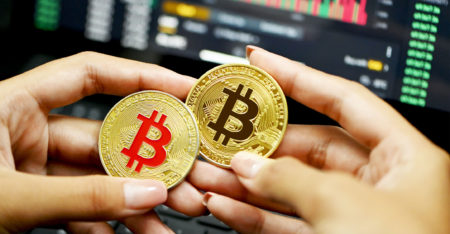 A bout of bitcoin turbulence caused by US Securities and Exchange Commission lawsuits against key crypto exchanges may be a precursor to short-term gains in the token, if history is any guide.
A bout of bitcoin turbulence caused by US Securities and Exchange Commission lawsuits against key crypto exchanges may be a precursor to short-term gains in the token, if history is any guide.
The largest digital asset sank more than 5% on Monday, before recovering over 5% on Tuesday, as investors digested the agency’s actions first against Binance Holdings and then Coinbase Global.
Similar back-to-back seesaw moves of at least 5% occurred five times over the past two years and presaged an average climb of nearly 11% over the subsequent 30 days.
“Despite a wave of negative news, the market has displayed an amazing amount of resilience,” said Caroline Mauron, co-founder of digital-asset derivatives liquidity provider OrBit Markets “However, any potential gains in the near future may be limited until there is greater clarity in the regulatory landscape in the US.”
The SEC on Tuesday widened its sweeping crackdown on crypto by accusing Coinbase of running an illegal exchange. A day before that, the agency alleged a range of violations in a lawsuit against Coinbase’s rival, Binance.
The moves come amid depressed liquidity in digital-asset markets and lingering scepticism about the future of crypto after last year’s deep rout and blowups like the bankruptcy of the FTX exchange.
“Investors are closely monitoring the outflow from major exchanges, fearing a situation similar to the recent FTX bank run,” Mauron said.
Outflows slow
The net outflow from Binance eased to US$449-million on Tuesday from $702-million on Monday — the latter was the highest since February, according to a Dune Analytics dashboard from exchange-traded products issuer 21Shares.
Bitcoin edged less than 1% lower to $26 800 as of 8.17am on Wednesday. Second-ranked ether was steady. Bitcoin has added about 62% this year, a partial revival after 2022’s crypto crash.
BNB, the native token of Binance, has lost about 7% since the SEC’s lawsuit against the platform hit on Monday, compared with a roughly 1% decline in an index of the biggest 100 digital assets. — Akshay Chinchalkar, Suvashree Ghosh and Sidhartha Shukla, (c) 2023 Bloomberg LP




